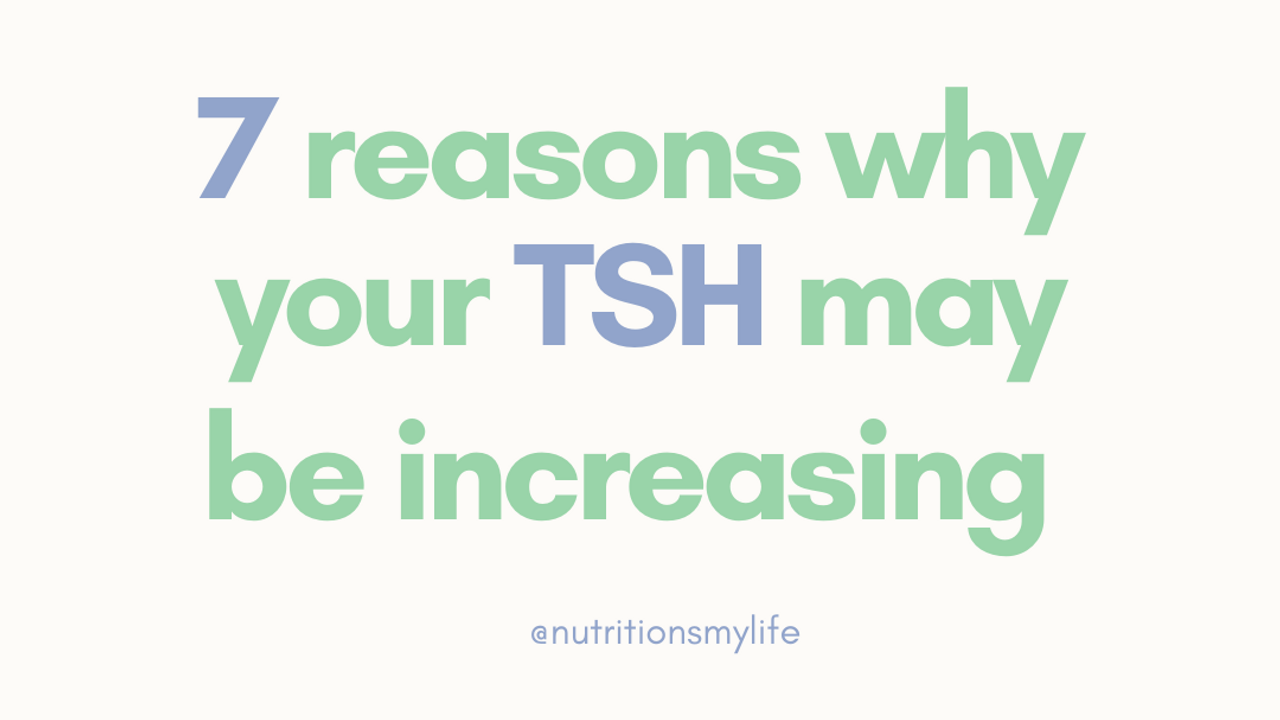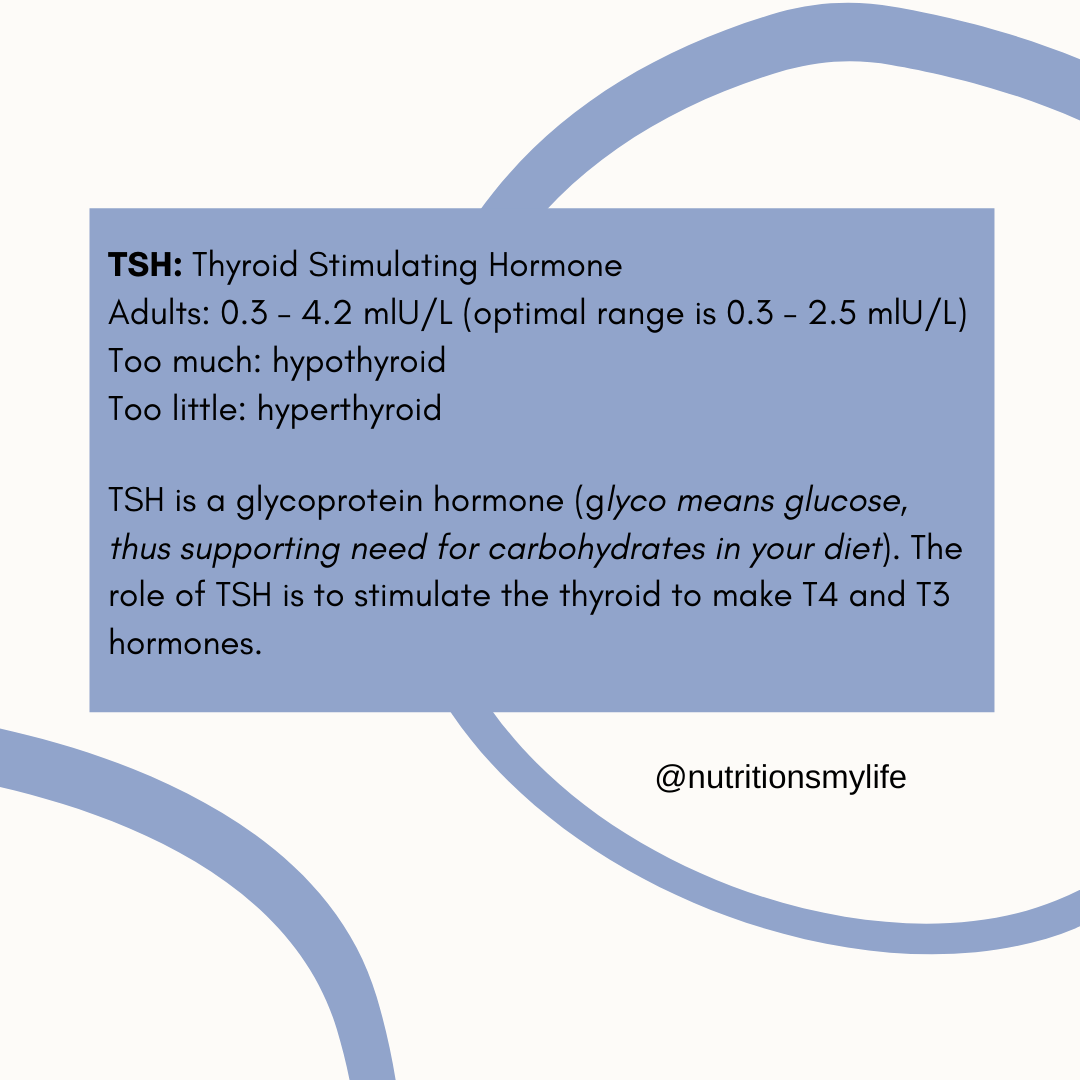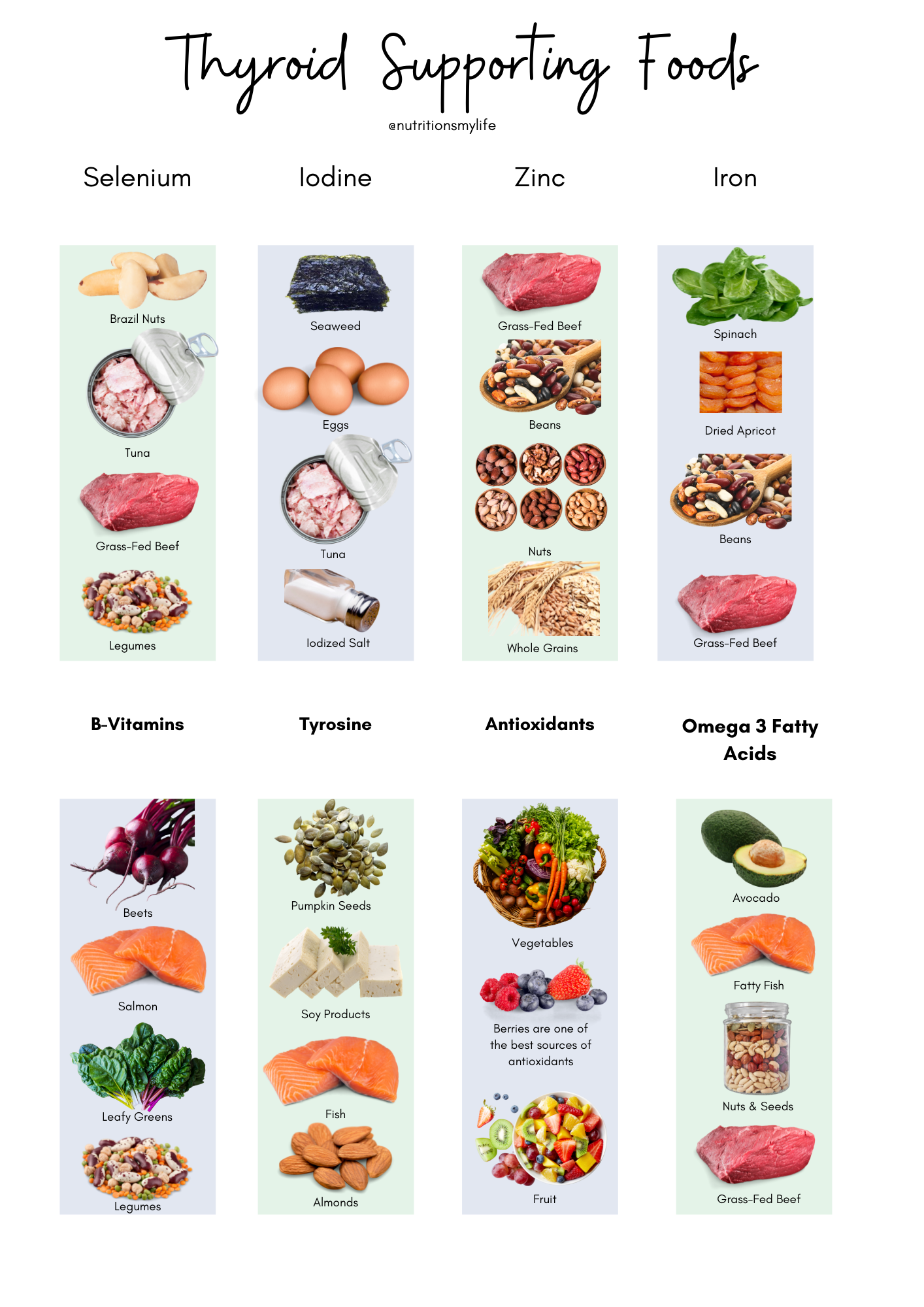
7 reasons why your TSH may be increasing
Oct 21, 2021If you are a thyroid warrior and noticed your TSH increasing... let's investigate.
I have had doctors tell my clients, "Your labs look great. See you next time" but in reality their TSH has been steadily increasing over the last 2 years going from 1.5 to 1.7 and then up to 3.5 (see graphic below for normal ranges). Could it be because she's working out more and not eating enough for the amount of energy she's expending? Could she still be using endocrine disrupting household items? Could her autoimmune disorder be causing underlying inflammation resulting in elevated reverse T3?
In this article, I'm helping you understand what could possibly be going on when there is an increase in TSH. Please note that lab interpretation needs to be done by a health professional. Please reach out to your doctor, nurse practitioner, or dietitian for further guidance.
*This article is for educational purposes only

* All lab data from mayocliniclabs.com
Why is your TSH increasing?
TSH stands for Thyroid Stimulating Hormone and is actually produced by the pituitary gland in the brain. TSH stimulates the thyroid to make T4 and T3. T4 is the inactive thyroid hormone and needs to be converted by the body into the active form of T3.
Many people have labs in the normal range but are still struggling with hypothyroid symptoms. Two oversights that can happen in reviewing a lab is not monitoring trends and the other is utilizing supporting labs to assist with the interpretation of that lab.
Let's review why someone's TSH may be increasing and why you're still having hypothyroid symptoms, even when labs are in normal limits. If you see an increase in TSH and don't feel well, still struggling to lose weight, have thinning hair, or other symptoms... it's time to investigate to figure out what could be happening.
Below you'll find 7 reasons your TSH may be increasing.
1) TSH increased because of low T3
T3 is the active thyroid hormone. I like to think of it as the gas pedal to the car. If you want the car to go faster, you need more T3 and for that T3 to actually activate a T3 receptor site. When T3 is low in the blood, your pituitary gland will become activated to make more TSH. Just because a lab is in the normal range doesn't mean it's your normal.

* All lab data from mayocliniclabs.com
Let's do a case study.
40 year old female with T3 of 2.3 pg/mL and increased TSH of 4.7 mlU/L. If you look back on the trend, it T3 was 3.5 pg/mL the year before. TSH of 4.7 is just slightly elevated but elevated enough to have symptoms of weight gain, thinning hair, exhaustion, anxiety, and digestive issues. Even though both labs are not that far out of range, people feel the difference. Now we need to figure out WHY this is happening.
Is low T3 caused from:
- Could a low T3 be caused because of a conversion disruption? Once the thyroid is stimulated by TSH, it makes mostly T4 and a little bit of T3. This means the body still has to convert T4 to the active T3. If there is a disruption in the conversion, then the TSH will be elevated due to low T3. Low T3 is exhaustion, constipation, etc... it the metabolism us thyroid warriors are desperately seeking out.
- Causes of poor conversion of T4 to T3 may be due to fatty liver (alcoholic or non-alcoholic fatty liver) or elevated LFTs (liver function tests). You will be surprised by how many people actually have some sort of liver dysfunction starting. The liver is responsible for removing one of the iodines from T4 to make T3 (1). However, if liver damage is present - this important conversion to T3 may suffer resulting in low T3 levels.
- Another cause of low conversion of T3 could be a lack of tools. This is where eating certain foods to support your thyroid comes into play (see list below). Iodine, selenium, zinc, iron, and carbohydrates either play a role in thyroid hormone metabolism or influence the metabolism of thyroid hormones. Both anemia and low carbohydrate intake (2) have been shown to decrease conversion of T4 to T3.
- Elevated estrogen/estrogen replacement therapy causing elevated TBG (Thyroxine binding globulin). TBG binds to thyroid hormones in the blood, therefore an increase in TBG results in a decrease in thyroid hormones (3). That means your body doesn't receive what it needs.
- Causes of poor conversion of T4 to T3 may be due to fatty liver (alcoholic or non-alcoholic fatty liver) or elevated LFTs (liver function tests). You will be surprised by how many people actually have some sort of liver dysfunction starting. The liver is responsible for removing one of the iodines from T4 to make T3 (1). However, if liver damage is present - this important conversion to T3 may suffer resulting in low T3 levels.
- Could low T3 be caused from high reverse T3 (rT3)? RT3 is the mirror image of T3 and unlike it's helpful counterpart, rT3 is completely useless and does not activate the T3 receptor site. When rT3 is elevated it is inversely related to T3. However, like you see above, a low T3 does not always mean a high rT3. Repeat- rT3 will cause a low T3 but a low T3 does not always mean rT3 will be high.
- Causes of high rT3 include calorie restriction (I'll say it again- 1200 calories is not enough for an adult), chronic inflammation (do you have an autoimmune disorder or massively stressed/not sleeping?), cancer, trauma/stress etc (4). rT3 is not used by many people to help investigate what's going on, in fact the Thyroid.org does not recommend it in diagnosing of hypothyroidism or hyperthyroidism. However, we're not trying to diagnose. A diagnosis has already occurred with the elevated TSH and low T3 by the doctor and I, as a dietitian, can not diagnosis but I can figure out if we need to look into some's inflammatory markers or look more into someone's Omega 3 fatty acid intake is meeting the demand of the body. Supporting labs can help me look more into seeing if someone is eating enough for their energy expenditure (because cutting calories does not always work for thyroid warriors).
- Causes of high rT3 include calorie restriction (I'll say it again- 1200 calories is not enough for an adult), chronic inflammation (do you have an autoimmune disorder or massively stressed/not sleeping?), cancer, trauma/stress etc (4). rT3 is not used by many people to help investigate what's going on, in fact the Thyroid.org does not recommend it in diagnosing of hypothyroidism or hyperthyroidism. However, we're not trying to diagnose. A diagnosis has already occurred with the elevated TSH and low T3 by the doctor and I, as a dietitian, can not diagnosis but I can figure out if we need to look into some's inflammatory markers or look more into someone's Omega 3 fatty acid intake is meeting the demand of the body. Supporting labs can help me look more into seeing if someone is eating enough for their energy expenditure (because cutting calories does not always work for thyroid warriors).
Lack in tools (aka nutrients) can cause disruptions in the making or synthesis of hormones. Some nutrients were already discussed earlier, like lack of iron or anemia results in a lower conversion of T4 to T3.
Selenium is another nutrient that is needed for multiple reasons. Selenium is an essential trace mineral that must be obtained in the diet. It is involved in over two dozen processes in the body, many being the immune system and thyroid health. Selenium Concentration is higher in the thyroid gland than in any other organ in the body (5). Selenium is a potent antioxidant and has been shown to help decrease TPO antibodies. If your own body is attacking it's own thyroid, don't you think it would have a difficult time making the proper hormones?
There are so many tools that can aid in the metabolism of healthy thyroid hormones. For full understanding of foods and thyroid tools, check out my book, The Healthy Thyroid Guide, for more guidance.
See graphic below for thyroid supporting nutrients and the some foods that contain these important nutrients. Please see your doctor or dietitian prior to starting a new health regimen.

3) TSH increased because of pituitary problems. A small group of people will have a difficult time with their hormones due to pituitary problems. This could be a tumor or cancer. The pituitary is what secretes TSH to stimulate the thyroid to make thyroid hormones. I have not come across too many people in my practice with pituitary issues and referring to a specialist is recommended.
4) TSH increased because of autoimmune disorders. Hashimoto's thyroiditis and Graves disease are the two autoimmune disorders that attack the thyroid. Hashimoto's disease is more than likely results in hypothyroidism however can cause some people to swing low, hypothyroid, and then swing high, hyperthyroid. Whereas, Graves disease is strictly hyperthyroidism. If the body is attacking the thyroid gland, how good do you think it will be at producing the T4 and T3 the body needs?
When the body is attacking the thyroid, this will result in abnormal levels of T4 and T3 (depending on whether it's Hashimoto's or Graves). There are many things that can be done to decrease someone's autoimmunity or presence of antibodies.
Was increased autoimmunity happening because of low vitamin D? Autoimmune disorders tend to also result in low levels of vitamin D or low levels of vitamin D result in more autoimmune disorders. No matter how you look at it, vitamin D plays a massive role in the immune system and low levels are not good. I personally like to keep my vitamin D level around 60 nmol/L.
5) TSH increased because of endocrine disruptors blocking hormone receptor sites. Sometimes the perfumes we love or the pumpkin spice scents cause more harm than good. Endocrine disruptors are man-made chemicals that can disrupt the synthesis, circulating levels, and peripheral action of hormones (6).
I'm not going to go too much into depth on endocrine disruptors here today but a good website for you to check your products you use daily is www.EWG.org to see if what you're using is a good choice. You can also learn more about endocrine disruptors in The Healthy Thyroid Guide as I share laundry and cleaning recipes that I use.
6) TSH increased due to change in medication. Sometimes a drop in medication can result in an increase in TSH. Note, changes in medications should only be done under supervision of your doctor.
There are many factors that can influence TSH and if you notice a trend of your TSH increasing, it's okay to ask for supporting labs to investigate why it's trending up. Also, note that TSH can and will fluctuate daily. Fluctuations do not always mean that something is wrong or that you need to be worried. IF you're having symptoms WITH the fluctuations, then yes, let's investigate more.
Be your own advocate- I've come across many doctors not wanting to draw thyroid supporting labs. It's okay to ask for labs you want drawn, it's okay to get a second or third opinion, and it's okay to keep searching for the root cause of your symptoms!
Share this post with other thyroid warriors that are wanting to feel better and be back in control of their health again.
If you have further questions, I have one on one sessions available or visit Amazon for my new book, The Healthy Thyroid Guide.
Know I'm here to help!
Your fellow thyroid warrior and nutrition expert,
Nicole Eichinger
Registered Dietitian
References:
(1) https://academic.oup.com/qjmed/article/95/9/559/1574610
(2) https://pubmed.ncbi.nlm.nih.gov/1249190/
(4) https://www.ncbi.nlm.nih.gov/pmc/articles/PMC6917573/

